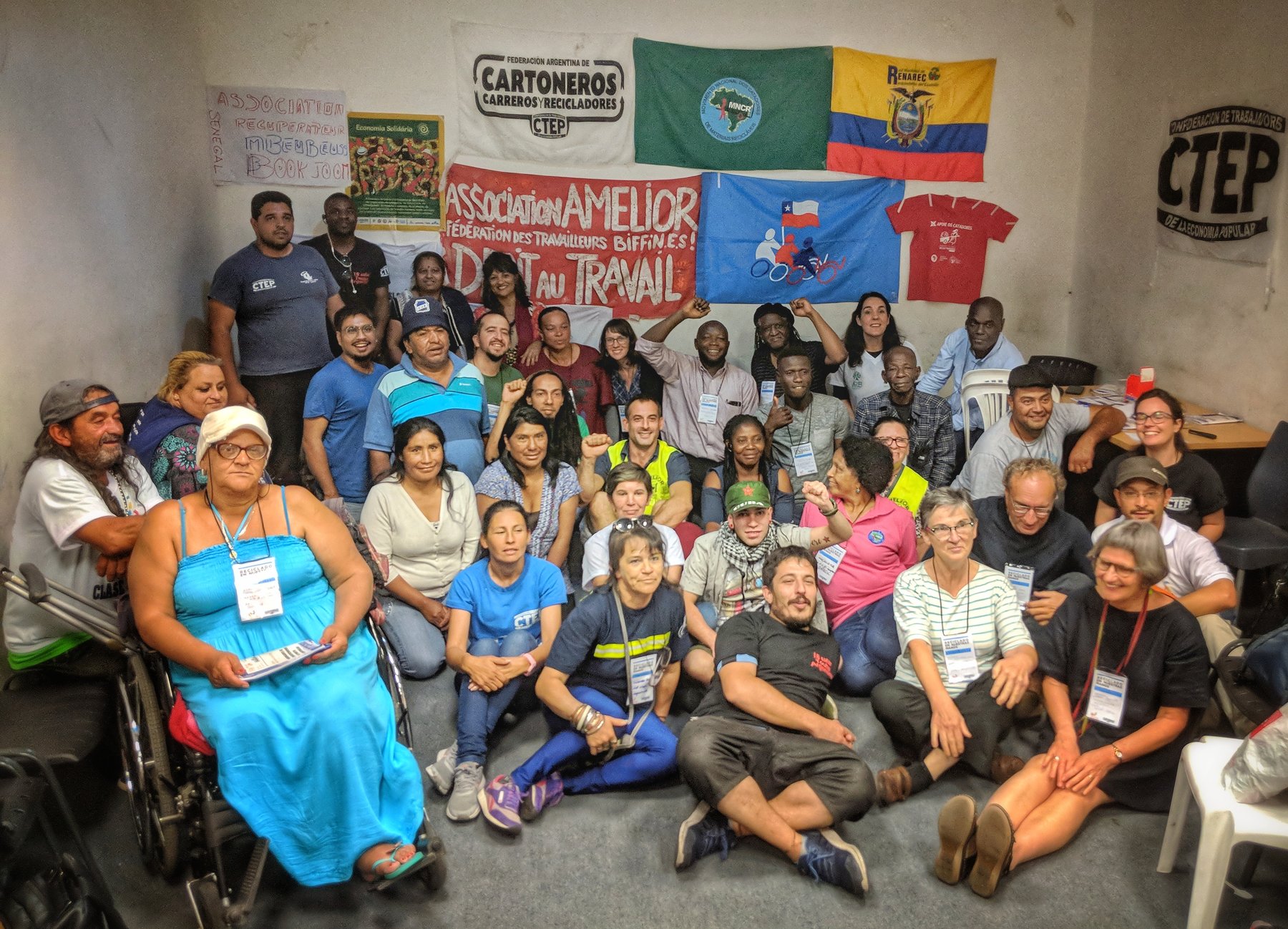The program for May 4 includes a morning documentary on the organization of waste pickers in Argentina, followed by visits to several waste pickers’ cooperatives to observe their daily street collection work and learn about their collective management model. After a typical Argentinean meal, the “Asado”, and a free afternoon to get to know Buenos Aires, the day will conclude with a visit to the headquarters of UTEP, a union of workers of the popular economy in Argentina, and an International Farewell Party with artistic performances and a shared dinner among delegations.
- 8:30h Documentary “Patria Cartonera”
- Cooperativa de los Amanecer de los Cartoneros
- 9:15h Street Collection
- 10:00h Verde Barracas Centre
- 11:00h Recicladores Unidos de Avellaneda Cooperative
- 13:00h Asado (Barbeque)
- 16:00h Free afternoon
- 19:00h UTEP (Unión de Trabajadores y Trabajadoras de la Economía Popular – Popular Economy Workers' Union)
- 19:15h International Festival in the Constitución Neighborhood
8:30h Documentary “Patria Cartonera”
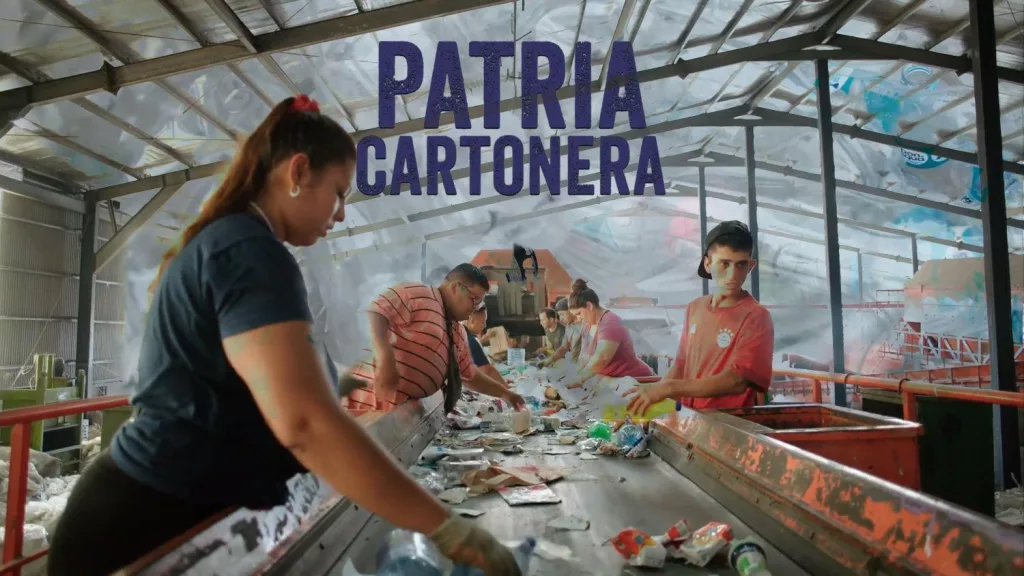
We will screen the documentary “Patria Cartonera”, produced by the Federación Argentina de Cartoneros, Carreros y Recicladores (FACCyR), at the Gaudí Room of the NH Hotel. This documentary was filmed in several coastal cities in Argentina and aims to convey how the country’s recyclers have managed to improve their working and living conditions through collective organization and unionization. It also explores the important work of environmental care involved in recycling.
The making of this documentary was supported by WIEGO in the framework of the project “Waste Reduction in Coastal Cities through Inclusive Recycling” (ReWCC). It is in Spanish with English subtitles for greater accessibility.
Cooperativa de los Amanecer de los Cartoneros
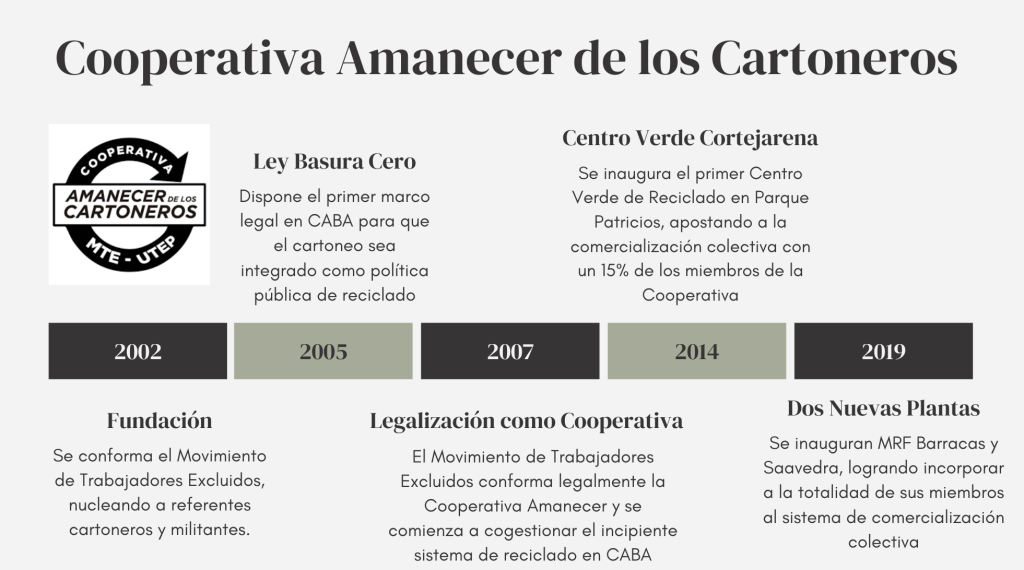
The Amanecer de los Cartoneros Cooperative is the core of the organizational process of the Federación Argentina de Cartoneros, Carreros y Recicladores (Argentine Federation of Cartoneros, Carreros and Recyclers) and operates in the Autonomous City of Buenos Aires. It is a model that serves as an example in our country to demonstrate that recyclers are capable of managing a quality system in unity and democracy. Since 2002, cartoneros, cartoneras and activists began to organize, fighting against police violence and the persecution of cartoneros’ work in the streets.
The first great victory came in 2005 with the approval of the Zero Garbage Law, which established the first legal framework in the City of Buenos Aires for the integration of cartoneros as a public recycling policy. The Cooperative was legalized in 2007 to begin the process of co-management with the City Government, which allowed the system to be financed through service agreements.
The Amanecer Cooperative began with the recognition of payment for service, guaranteeing basic income to its associates and the sale of the material, obtaining safe transportation for its workers in buses and for the material in trucks. In 2014, the first Green Recycling Center was inaugurated, managed entirely by recyclers. The collective commercialization process was deepened in order to sell directly to the industry and thus improve the income of each recycler.
In 2019, two new plants with advanced technology were inaugurated, allowing all associates to participate in collective marketing. Currently, the Cooperative has more than 4,700 associates and collects an average of 2,500 tons per month, which are processed in its three Green Centers and reintroduced to the industry.
Each member receives a monthly salary for their tasks, as well as a variable payment based on the amount of recycled material. The Cooperative addresses the social problems of the recycling sector in a comprehensive manner, with projects that include six Children’s Recreation and Learning Centers for members’ children, access to health coverage, soup kitchens, teams of environmental, health and gender promoters, and a Senior Citizens’ Center.
9:15h Street Collection
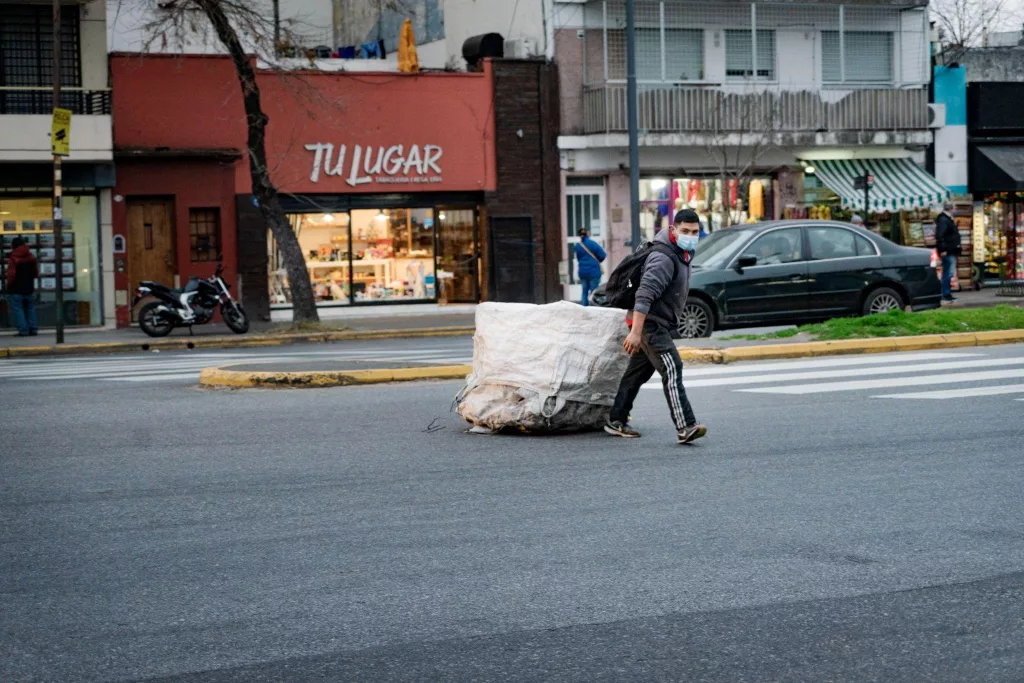
During the week, near the hotel, we will watch the recyclers collecting material, while Cooperativa Amanecer’s trucks pick up the materials to take them to the Centro Verde. We will stay in Microcentro, a neighborhood where the cooperative works Monday through Friday.
Every four years, the cooperative signs an agreement with the City Government to detail the services provided. Historically, the cooperative is in charge of collection in one-fifth of the city’s territory. Collection is organized in ‘routes’, with door-to-door routes assigned to each recycler. There are currently 48 routes, each with democratically elected delegates responsible for ensuring the proper functioning of the service. Once collection is complete, the logistics team moves the materials to the green center to be weighed, sorted and sold.
During our visit, we will have the opportunity to learn first-hand how they are organized and talk to the protagonists of this important work.
10:00h Verde Barracas Centre
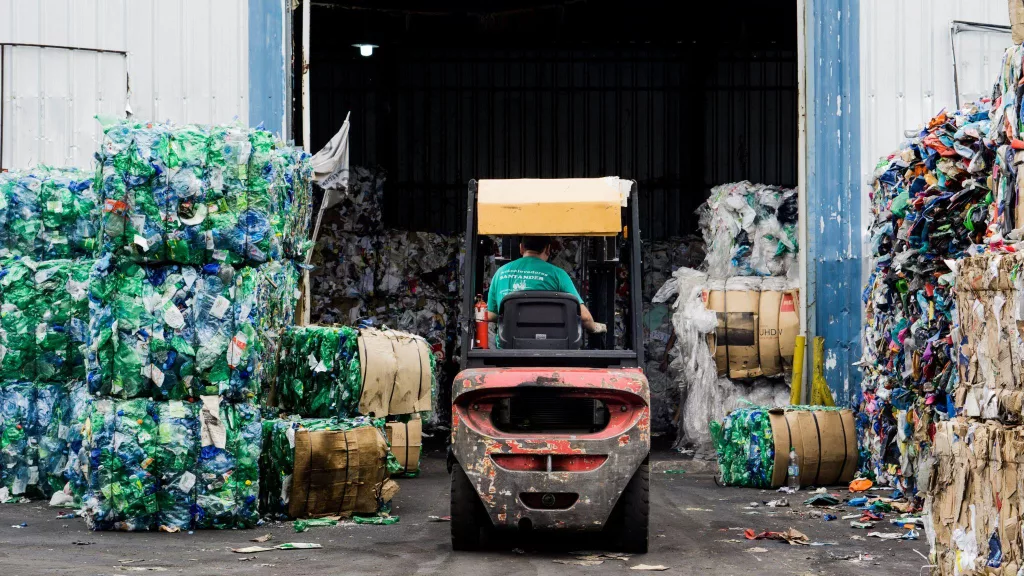
We will pay a short visit to the Barracas Green Center. This MRF (Mechanical Recycling Facility) plant was inaugurated in December 2019 and allowed the full integration of the Cooperative into the collective marketing system. It is an outstanding model in our country due to its capacity and efficiency in management. In addition, it collaborates with other FACCYR cooperatives to obtain better prices in the industry. Currently, 300 people work as operators in three shifts, guaranteeing the collection of more than 1,200 street waste pickers.
On Saturday, February 3 of this year, the Centro Verde Barracas suffered an intentional fire. The loss of machinery and years of work is incalculable. Investigations continue, and this incident reminds us of the great interests that the grassroots waste pickers’ organization faces from other sectors that seek to keep waste pickers submissive and disorganized. However, not even fire will be able to stop this movement that has won so many rights. The Cooperative has already designed a plan for the members that depended on Barracas to continue with the collection, classification and commercialization of the material through other cooperatives of the Federation, while the planning for the reconstruction of Barracas is being advanced.
11:00h Recicladores Unidos de Avellaneda Cooperative
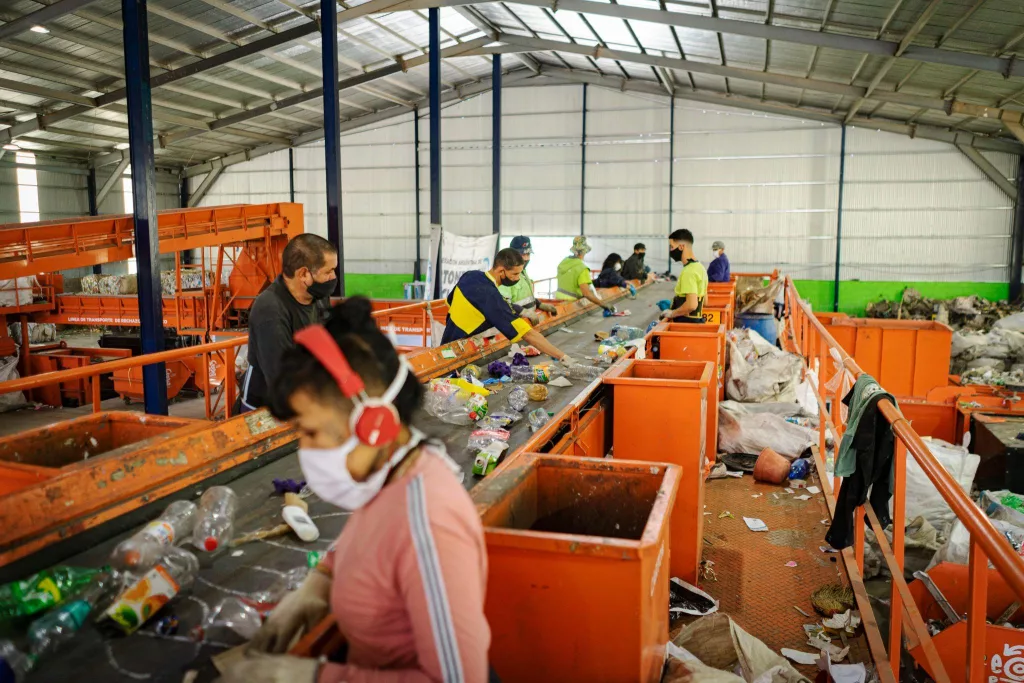
In the Cooperativa Recicladores Unidos de Avellaneda, 200 cartoneros and cartoneras work and recycle more than 100 tons per month. The collection and sorting scheme is similar to that implemented in the Amanecer Cooperative: door-to-door collection, environmental promotion, logistics of transfer to the center, sorting and sale to the industry. In addition, added value is generated in plastics and electrical and household appliance waste for reintroduction into the industry.
But this path was not easy, and during the visit we will be able to learn about the history of struggle of the associates of this cooperative. In 2017, the Municipality tried to move forward with a municipal system for the collection of recyclable material and it was buried. The recyclers’ source of work was threatened, as there was no material left on the public road. They organized themselves as a cooperative and decided to fight as a unit for their rights and recognition. The recycling plant was built by the Municipality but was in disuse. On September 17, 2018, the cooperative members together with the Federation occupied the space and managed to negotiate a co-management system with the recognition of their work.
Currently, Recicladores Unidos de Avellaneda is a fundamental cooperative so that, after the serious fire, Amanecer can continue with the work of its associates. They receive the material from Buenos Aires at night and allow its classification and commercialization.
13:00h Asado (Barbeque)
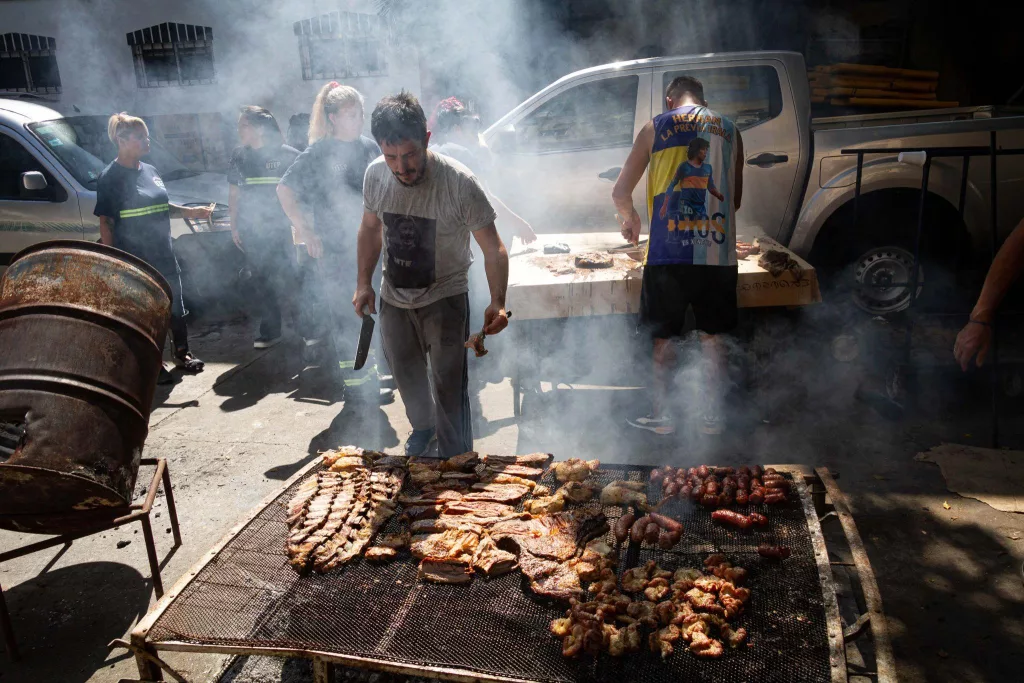
We will share an asado, an emblematic tradition of Argentine culture. The country has vast expanses of plains, known as the Pampa region, which for centuries have been home to cattle raising. Since the middle of the 19th century, the gauchos, horsemen of the popular sectors who worked for the landowners in the countryside, were already preparing asados.
The asado consists of various cuts of beef, cooked over the coals and accompanied by sauces and salads. However, it goes beyond a simple meal: it is a moment of encounter that reflects a ritual rooted in Argentine culture. From the preparation of the asado to the waiting and the prolonged moment afterwards known as “sobremesa”, conversations, discussions and encounters with loved ones that deserve to be shared are encouraged.
Asado transcends all social classes. In addition, in consideration of the diversity of food preferences, we will offer a vegetarian menu of roasted vegetables so that all members of the group can enjoy this unique moment of conviviality to the fullest.
16:00h Free afternoon
After lunch, we will have a few hours free. You will be able to rest, but we will also have companions available for cultural visits in the vicinity of the Congress.
You can also consult the “Waste pickers’ Guide to Buenos Aires” to learn more about some options.
It is important to take into account the departure time to our International Party, since we will leave and return together by bus. Departure is at 19:00hs punctual at the hotel lobby.
19:00h UTEP (Unión de Trabajadores y Trabajadoras de la Economía Popular – Popular Economy Workers’ Union)
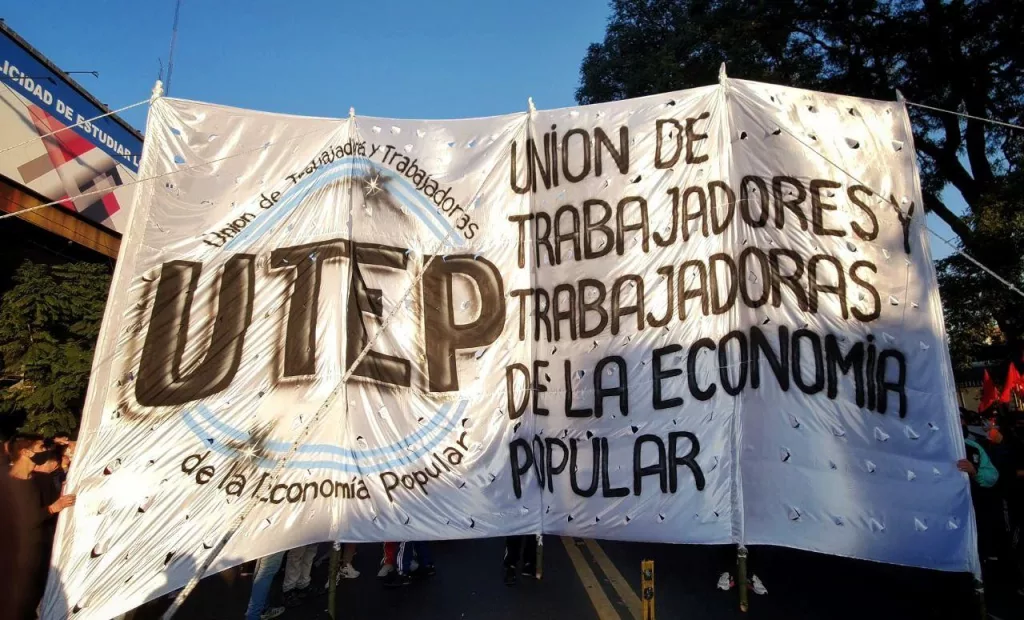
Before the International Festival, we will visit the headquarters of UTEP, the Unión de Trabajadores y Trabajadoras de la Economía Popular, a union that represents and defends the rights of all those excluded from the labor market, those of us who generate our own work to survive. This trade union organization is independent of all political parties and stands as a tool of struggle for the restitution of labor and social rights that were taken away from us by neoliberalism and that we have not yet recovered.
The popular economy encompasses 30% of the economically active population in Argentina, representing at least 6 million people, of which only 1 million are organized. UTEP brings together these workers who did not have an institutional space to express their claims and win their rights collectively.
This organization is structured in different branches of work, such as cartoneros, peasants, artisans, street vendors, fair vendors, seamstresses, workers of recovered enterprises, construction workers and socio-community workers. The FACCYR, the waste pickers’ branch of UTEP, brings together 150 cooperatives of cartoneros throughout the country.
Throughout the years of struggle, many achievements have been made to advance our rights:
- 2021: Obtaining the Social Personality and Recognition by the National Ministry of Labor.
- 2016: Enactment of the Social Emergency Law, creation of the National Registry of Popular Economy and establishment of the Complementary Social Wage.
- 2018: Creation of RENABAP and enactment of the Socio-Urban Integration Law, as well as the national survey of the 4,416 popular neighborhoods.
19:15h International Festival in the Constitución Neighborhood
In the evening, we will have an International Farewell Party of our First Elective Congress in Constitución neighborhood.
We will have surprise Argentinean artistic performances while we share dinner.
We invite delegations who wish to wear their costumes, prepare songs and share.
The dinner will be in another neighborhood, Constitución, and it is important to respect the departure time since we will travel by private transportation. On the way back, we will also return all together to the Hotel.
